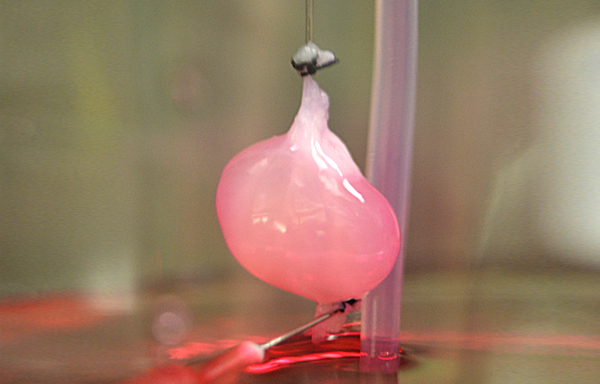Bioengineered kidney transplanted into rat
Cleansed of cells and repopulated anew, organ successfully produces urine
By stripping a kidney of its cells and repopulating it with new ones, scientists have shown in a rat that a bioengineered kidney can function to some extent like a normal one. The work, published April 14 in Nature Medicine, reveals that the protein scaffold of a kidney provides the architecture and chemical cues that new cells need to adopt the roles of kidney cells.

The results may one day assist in alleviating the transplant organ shortage by providing patients with refurbished kidneys. If bioengineering can make use of kidney scaffolds that come from animals or cadavers whose kidneys would otherwise have been discarded, it could provide many kidneys for transplant, says Shay Soker, a cell biologist at Wake Forest University in Winston-Salem, N.C., who was not involved in the study.
The study deserves high marks for advancing techniques that others may adopt in bioengineering kidneys, says Edward Ross, a nephrologist at the University of Florida in Gainesville. “This is still very early, but they’ve come a long way. It’s really beautiful work.”
The kidney is a complex organ that performs the delicate work of filtering waste out of the blood and keeping electrolytes balanced. When kidneys fail, a person’s only options are dialysis or a kidney transplant. But candidates for kidney transplant far outnumber available donors.
For the study, Harald Ott of Harvard Medical School and colleagues started with a rat cadaver’s kidney that had been surgically removed and used a detergent to strip the organ of its cells. The approach leaves intact the extracellular matrix, the collagen and other compounds that support and hold together the kidney.
After clearing out the cells, Ott’s team “seeded” the kidney scaffold with healthy neonatal kidney cells from rats and blood vessel cells from humans. Over several days, the cells latched onto the kidney structure and proliferated. The cells also produced proteins essential for kidney function, grew into structures that resembled the filtration units in mammalian kidneys and even made small amounts of urine.
The researchers then transplanted the freshly minted kidney into a live rat that had had a kidney removed. Inside the rat, the bioengineered kidney produced a small amount of urine. The authors say this experiment proves the principle that a regenerated kidney may work in a live mammal.
Scientists who are keen to remedy transplant organ shortages have used a similar cell-removal technique in attempts to regenerate tracheas, bladders, livers, hearts and lungs — all in animals. “Ten years from now, when we look at the accumulation of findings, I hope this approach will have turned into some kind of clinical treatment,” says Soker, who is researching organ regeneration in a pig. While the new study is limited to a rodent, it is progress, he says. “I applaud what they did. It’s another building block that we can all learn from.”







